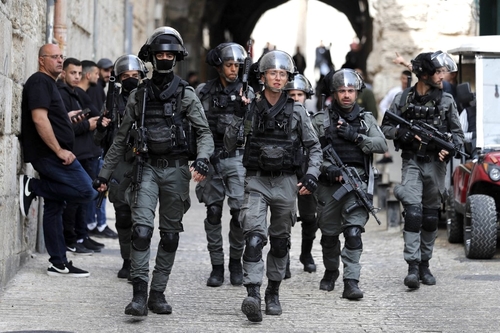"Everything changed" in Israel on Oct. 7. Except it did not. Despite much talk of victory by the prime minister and survey research showing the public endorses a tough new approach, Israeli officialdom and its security establishment show signs of reverting to their old failed policies, even before the bodies have all been buried.
Those failed policies mean primarily one thing: wrongly assuming that enrichment – more work permits in Israel, a larger fishing zone, outside funding – gives Palestinians something to lose, taming them and making them less inclined to aggress.
Symptoms of that sad reversion include the following:
The security establishment approved the entry of 8,000 West Bank workers to Israel, mostly to engage in agricultural work. It did so in response to Israel's agriculture minister assuring his colleagues that the workers had been vetted and posed no danger. That thousands of workers from Gaza had spied on Israel and made themselves complicit in the Oct. 7 massacre seemed blithely to be forgotten.
On the West Bank itself, Israel's commanding general there issued oxymoronic orders limiting Arab access that appeared tough but changed very little. As explained by the Binyamin Regional Council, "There is no entry into Israeli towns for Arab workers. They will be permitted to enter industrial areas at night only." Do marauders and murderers carry out their crimes only in daylight?
The Palestinian Authority that nominally governs part of the West Bank not only offered full-throated support for the Hamas massacre but boasted of having a role in it. The PA also required mosques in its jurisdiction to instruct congregants that exterminating Jews constitutes an Islamic duty. Despite this, the Israeli cabinet continues to send tax monies to the PA. Defense Minister Yoav Gallant endorsed this decision, saying that "It is appropriate to transfer, and transfer immediately, the funds to the Palestinian Authority so that they will be used by its forces who help prevent terrorism." (That theme of enrichment never seems to die.)
 Israeli police. |
National Security Minister Itamar Ben-Gvir tried to loosen the rules of engagement for police officers, permitting them in emergencies to shoot at the legs of aggressors but Benny Gantz, a member of the War Cabinet, managed to deflect the vote, thereby keeping the more restrictive regulations in place.
Five days after Oct. 7, Israel shuttered its Public Diplomacy Ministry, providing a perfect symbol of Israel's historically hapless information efforts.
 Contrarily, Israel's communications minister called Al Jazeera, the Qatari television channel, a "propaganda mouthpiece" that incites against Israel and attempted to close down its office in Israel. The government rejected his recommendation, wanting not to upset the Qatari government, which had helped with the release of several hostages, thereby ignoring its role in perpetrating Oct. 7. Yossi Cohen, the former head of Mossad, goes further; he favors "refraining from criticizing Qatar."
Contrarily, Israel's communications minister called Al Jazeera, the Qatari television channel, a "propaganda mouthpiece" that incites against Israel and attempted to close down its office in Israel. The government rejected his recommendation, wanting not to upset the Qatari government, which had helped with the release of several hostages, thereby ignoring its role in perpetrating Oct. 7. Yossi Cohen, the former head of Mossad, goes further; he favors "refraining from criticizing Qatar."
Before the massacre; Israel supplied Gaza with 49 million liters, or 9 percent of the territory's daily consumption, through three pipelines. It cut all supplies after the massacre. But that lasted just twenty days, after which Israel reinstated 28.5 million liters through two pipelines. Why not all three? Because Hamas had damaged the third on Oct. 7, necessitating repairs. Not to fear: IDF Col. Elad Goren announced his office had "assembled a team of experts who assess the humanitarian situation in Gaza on a daily basis." Avigdor Liberman, head of the Yisrael Beiteinu party, called this "simple idiocy." Fuel supplies also reportedly resumed.
 Water delivery to Gaza resumed by pipeline and truck. |
Talk of victory did not stop negativism from quickly rearing its head. "I don't see any kind of victory going out of this mess," comments Fauda creator Avi Issacharoff. Orly Noy of B'Tselem cries out to her Israeli conationals, "I have no interest in the victory you're offering me. ... I'm ready to admit defeat."
The principal of a public high school in Tel Aviv devoted 45 minutes to talking to three students who had come to school wrapped in Israeli flags. During the conversation, one student reported, the principal pointed out that other students objected to such a display of patriotism, adding that "if a large number of students came to school wrapped in Israeli flags, he would end this immediately."
I concluded a recent article by expecting that "the inflamed Israeli mood of the moment will likely fade with time, as old patterns reassert themselves and business-as-usual returns." I was wrong in one aspect; it did not take time. Rather, at least in some respects, it occurred almost right away.
Mr. Pipes (DanielPipes.org, @DanielPipes) is president of the Middle East Forum and author of the just-published Islamism vs. The West: 35 Years of Geopolitical Struggle (Wicked Son). © 2023 by Daniel Pipes. All rights reserved.
Nov. 17, 2023 addendum: The fuel supplies from Israel mentioned above that reportedly resumed have been confirmed: "two fuel trucks enter Gaza every day for UN needs and to support water and sewer systems." Unsurprisingly, the statement announcing this news indicated that the War Cabinet made reached this decision "based on the recommendation of the IDF and Shin Bet and at the request of US officials."
Critics were merciless.
- National Security Minister Itamar Ben Gvir: "So long as our hostages don't even get a visit from the Red Cross, there is no sense in giving the enemy humanitarian gifts."
- Finance Minister Bezalel Smotrich: This "is a grave mistake and contradicts the decision of the [full security] cabinet. [It] broadcasts weakness, gives oxygen to the enemy and allows [Hamas leader Yahya] Sinwar to sit comfortably in his air-conditioned bunker, watch the news and continue to manipulate Israeli society and the families of the abductees."
- Avigdor Liberman, head of the Yisrael Beytenu party: "Stop fueling the Nazis from Hamas! The statements that 'not a drop of fuel' would enter the Strip have turned into allowing thousands of liters unilaterally, without receiving any humanitarian gesture for our hostages. I call for this recklessness to be stopped at once."
Nov. 19, 2023 update: Finance Minister Bezalel Smotrich writes to Defense Minister Yoav Gallant:
From the information I have received, it appears that parts of the security system have begun to formulate the position of the State of Israel for the day after victory in the war. ... The IDF and the Defense Ministry must be immediately ordered to cease dealing with this issue and disband the teams established for this purpose. Israel after October 7 is not the same country. Things we held true in the past are no longer relevant. Bodies that were part of and even led the old conceptions [which led to the massacre] cannot be in charge of the efforts to formulate the solutions.
Nov. 21, 2023 update: Alex Nachumson writes at "Only an Israel victory can free the hostages":
As negotiations [with Hamas] were moving agonizingly forward, Israel decided to hold off on its impending offensive to start moving south, ostensibly because of [Hamas leader Yahya] Sinwar's threat to scupper talks.
For days now, the IDF seems to have been in a holding pattern at the mercy of Sinwar's deflections and distractions. He is holding off as long as possible to give him the one thing he craves more than anything else, time, and without having to hand over a single hostage. The IDF's momentum has been stunted and, incredibly, the advantage is creeping back towards Hamas.
Dec. 1, 2023 update: For a fuller version of this argument, plus slight updating, see "The Rapid Return of Israel's Disastrous Policy" in the Middle East Quarterly.